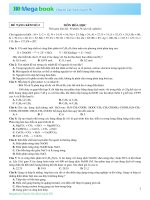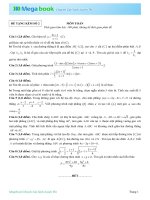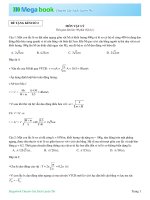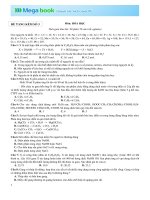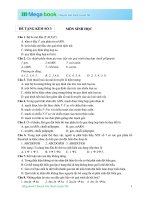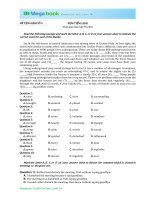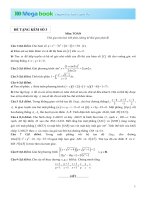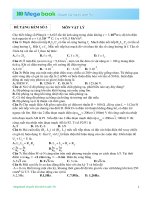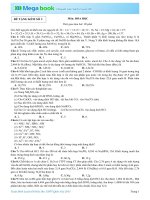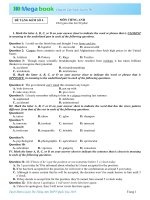- Trang chủ >>
- Đề thi >>
- THPT Quốc Gia
ĐỀ THI THỬ MÔN TIẾNG ANHTHPT 2015 KÈM LỜI GIẢI VÀ ĐÁP SỐ - ĐỀ SỐ 8
Bạn đang xem bản rút gọn của tài liệu. Xem và tải ngay bản đầy đủ của tài liệu tại đây (503.3 KB, 20 trang )
Tuyệt Đỉnh Luyện Đề Tiếng Anh THPT Quốc Gia 2015 1
BỘ ĐỀ MEGABOOK SỐ 8 MÔN TIẾNG ANH
Thời gian làm bài 90 phút
I. Mark the letter A, B, C, or D on your answer sheet to indicate the correct answer to each of the following
questions.
1.Allan. “Do you mind if I use your dictionary?”
Nick. “_______”
A. I’m afraid not. B. Without doubt. C. No, feel free. D. Straight ahead.
2._______ failing, the new car was an enormous success.
A. Far from B. Despite C. Apart from D.Although
3.He has passed the test with excellent result. He must have been working very hard,_______?
A. hasn’t he B. didn’t he C. wasn’t he D. mustn’t he
4.Oh, I’m always forgetting _______ these medicines. Is that before or after meal, Ron?
A. when to take B. what I will take with
C. on which I should take D. when I take
5.The dream was so _______ that I was convinced it had really happened.
A. bright B. lively C. vivid D. colorful
6.Do you know when his new album is _______? I’m looking forward it.
A. set out B. brought out C. broken out D. taken out
7.We live very far from the station, so she _______ a taxi because got here just ten minutes after the arrival of the
train.
A. must have taken B. would certainly take
C. had to have taken D. had to take
8.My father retired from work last month. He _______ for the same company for 40 years.
A. has worked C. had worked
B. had been working D. was working
9.Heavier fines should be imposed on anyone who _______ litter.
A. throws B. makes C. drops D. dumps
10.It is obligatory _______ the instructions on the label strictly.
A. when using this chemical they must follow
B. this chemical is used by following
C. the use of this chemical follow
D. for this chemical to follow
11.We rang the doorbell again _______ they hadn’t heard it the first time.
A. because B. although C. for fear that D. in case
12.How boring the lecture was! I _______ just in the first half of it.
A. dropped off B. fell out C. called off D. came out
13.Will it make any _______ to them if we deliver their equipment tomorrow?
A. displeasure B. alteration C. difference D. conflict
Tuyệt Đỉnh Luyện Đề Tiếng Anh THPT Quốc Gia 2015 2
14.What time are you _______ duty? Let’s have a coffee after that.
A. over B. on C. off D. out of
15.Philip. “Which would you like to eat, beef or chicken?”
Jennifer. “_______”
A. Beef seems fine B. No way! C. It’s on me? D. Either way.
16.Tom. “Mommy, can I go out with my friends at 9 this evening?”
Mrs. Sterne. “_______”
A. I’d rather not. B. Yes, with pleasure.
C. Please don’t. D. Sure. Have a go.
17.We have organized food and water _______ in African countries.
A. relief B. service C. distribution D. supply
18.I’d reminded him at least three times _______ to the meeting on time, but it turned out to be useless.
A. he should come B. to come C. of having come D. about the coming
19.Mrs. Wesley. “Who will help me put away the garbage? Ron?”
Ron. “_______”
A. Oh, no. Not for me. B. I’m not sure about it.
C. Wait a minute. D. Sure. I won’t do it.
20.Alex. “I’ve had my purse stolen!”
Bill. “Oh really? _______ How did that happen?”
A. Poor you! B. Bad luck, so. C. Never mind. D. It’s a pity.
21.John impressed me when he was a child. When I first met him, he came _______ an intelligent and honest boy.
A. up with B. over as C. in for D. up to
22.Bricks baked in a kiln are _______ are dried in the sun.
A. the hardest of those that B. much harder than those that
C. not as nearly hard as those D. far harder than those
23.You wouldn’t survive now _______ you from the debris.
A. had they not found B. if they hadn’t been finding
C. if they weren’t finding D. unless they found
24.Don’t give up your harboring dream. _______ working harder and harder.
A. Try out B. Keep on C. Speed up D. Go off
25.It’s been a good year. I’ve written two books and a couple of articles, and _______ are now in print.
A. both of which B. both of them C. all of which D. all of them
II. Read the following passage and mark the letter A, B, C, or D on your answer sheet toindicate the correct answer
to each of the questions from 26 to 35.
Accustomed though we are to speaking of the films made before 1927 as “silent,” the film hasnever been, in the
full sense of the word, silent. From the very beginning, music was regarded as an indispensable accompaniment; when
the Lumiere films were shown at the first public film exhibition in the Unites States in February 1896, they were
accompanied by piano improvisations on popular tunes. At first, the music played bore no special relationship to the
films; an accompaniment of anykind was sufficient. Within a very short time, however, the incongruity of playing
Tuyệt Đỉnh Luyện Đề Tiếng Anh THPT Quốc Gia 2015 3
lively music to a solemn film became apparent, and film pianists began to take some care in matching their pieces
tothe mood of the film.
As movie theaters grew in number and importance, a violinist, and perhaps a cellist, would beadded to the
pianist in certain cases, and in the larger movie theaters small orchestras were formed.For a number of years the
selection of music for each film program rested entirely in the hands of the conductor or leader of the orchestra, and
very often the principal qualification for holding such aposition was not skill or taste so much as the ownership of a
large personal library of musical pieces.Since the conductor seldom saw the films until the night before they were to
be shown (if, indeed,the conductor was lucky enough to see them then), the musical arrangement was normally
improvised in the greatest hurry.
To help meet this difficulty, film distributing companies started the practice of publishing suggestions for
musical accompaniments. In 1909, for example, the Edison Company began issuing with their films such indications
of mood as “pleasant,” “sad,” “lively.” The suggestions became moreexplicit, and so emerged the musical cue sheet
containing indications of mood, the titles of suitable pieces of music, and precise directions to show where one piece
led into the next. Certain films had music specially composed for them. The most famous of these early specialscores
was that composed and arranged for D.W. Griffith’s film Birth of a Nation , which was released in 1915.
26.The passage mainly discusses music that was ________.
A. specifically composed for certain movie theaters
B. recorded during film exhibitions
C. performed before the showing of a film
D. played during silent films
27.What can be inferred from the passage about the majority of films made after 1927?
A. They incorporated the sound of the actors’ voices.
B. They were accompanied by symphonic orchestras.
C. They corresponded to specific musical compositions.
D. They were truly “silent.”
28.The word “solemn” in paragraph 1 is closest in meaning to ________.
A. serious B. well-scripted C. inaudible D. formal
29.It can be inferred that orchestra conductors who worked in movie theaters needed to________.
A. have pleasant voices B. be familiar with a wide variety of music
C. be able to play many instruments D. be able to compose original music
30.The word “them” in paragraph 2 refers to ________.
A. years B. films C. hands D. pieces
31.According to the passage, what kind of business was the Edison Company?
A. It published musical arrangements. B. It produced electricity.
C. It made musical instruments. D. It distributed films.
32.It can be inferred from the passage that the first musical cue sheets appeared around________.
A. 1909 B. 1896 C. 1915 D. 1927
33.Which of the following notations is most likely to have been included on a musical cuesheet of the early 1900’s?
A. “Piano, violin” B. “Calm, peaceful”
Tuyệt Đỉnh Luyện Đề Tiếng Anh THPT Quốc Gia 2015 4
C. “Key of C major” D. “Directed by D.W. Griffith”
34.The word “scores” in paragraph 3 is closest in meaning to ________.
A. totals B. successes
C. musical compositions D. groups of musicians
35.The passage probably continues with a discussion of ________.
A. silent films by other directors
B. other films directed by D.W. Griffith
C. famous composers of the early twentieth century
D. the music in Birth of a Nation
III. Mark the letter A, B, C, or D on your answer sheet to show the underlined part that needscorrection.
36.So devastating were the floods that some areas may never have
A
recoveredin spite of efforts made to reduce loss.
B C D
37.We have to endure the hard timesand to hopethat things will change forthe
A B C D
betterin the future.
38.Poland and Japan have very little common, but what they do share is national
A B C
pride.
D
39.On refusal to give breath sample to the police, I am sureyou will be in great
A B C D
trouble.
40.The reasons for her overnight success are that shehas been working very
A B C
hard and support from her coworkers.
D
IV. Mark the letter A, B, C, or D on your answer sheet to indicate the sentence that is CLOSESTin meaning to each
of the following questions.
41.Fingerprints might have proved that the suspect was at the scene of the crime.
A. The suspect might be at the scene of the crime though his fingerprints have not been proved.
B. It was possible that fingerprints proved the presence of the suspect at the scene of the crime.
C. Fingerprints are proved to have belonged to the suspect at the scene of the crime.
D. Without doubt, the suspect was at the scene of the crime due to his fingerprints.
42.“Please be careful with your utterances especially here!” said Lucy to Ian.
A. Lucy reminded Ian of not saying anything unaccepted there.
B. Lucy insisted Ian on being aware of what was expected to be said there.
C. Lucy suggested Ian that he should take care of what he had said there.
Tuyệt Đỉnh Luyện Đề Tiếng Anh THPT Quốc Gia 2015 5
D. Lucy warned Ian to mind his words there.
43.“We will invest 40% total cost of the project in the first phase of it,” said the president.
A. The president planned to invest of 40% total cost of the project in phase one.
B. The president promised to put a 40% of the total cost of the project investment in it.
C. The president pledged their investment 40% of its total cost for the project’s first phase.
D. The president presented a plan to invest in the project 40% the total cost for its first phase.
44.“We can now say that the attack on our computer system last week was from China,”said the security expert.
A. The security expert concluded their computer system was attacked by someone from Chinalast week.
B. The security expert confirmed the information of an attack from a Chinese on their computersystem the previous
week.
C. The security expert accused China of attacking their computer system the week before.
D. The security expert blamed a Chinese hacker for pulling their computer system down the weekbefore.
45.Alice had already been to Venice, but she didn’t like it as much when she went thereagain last summer.
A. Alice liked Venice more on her visit last summer than she had when she had been therebefore.
B. Alice went to Venice again last summer because she had liked it so much the first time.
C. Alice went to Venice once, and even though she didn’t like it very much, she went there again.
D. Alice enjoyed it better the first time she went to Venice than her visit there last summer.
V. Mark the letter A, B, C, or D on your answer sheet to indicate the word or phrase that isCLOSEST in meaning
to the underlined part in each of the following questions.
46.Trudy felt ill at ease when she spoke in public for the first time.
A. felt uncomfortable and embarrassed B. felt difficult and lost confidence
C. felt challenged and inopportune D. felt nausea and dizzy
47.To everyone’s fury, misconduct by doctors and nurses is found out and ends up inmedia.
A. demoralization B. misdemeanor C. malpractice D. malevolence
48.One thing for sure is that war brings great ferocity, so no one wants to it to happen.
A. savagery B. depreciation C. disgrace D. gallantry
VI. Mark the letter A, B, C, or D on your answer sheet to indicate the sentence that bestcombines each pair of
sentences in the following questions.
49.The teacher gave some instructions. I don’t understand any of them.
A. The instructions the teacher gave are not understanding to me.
B. It was the instructions the teacher gave that confused me.
C. It hasn’t been clear to me about the instructions given by the teacher.
D. I’m finding it difficult to figure out what the teacher required according to his instructions.
50.Here is all your money. You’ll be given more after two days.
A. You’ll get money if you use all these money after two days.
B. It must be two days left before I’ll be given some more money.
C. Here is all the money you have to spend for two days.
D. All this money can only be used two days after.
Tuyệt Đỉnh Luyện Đề Tiếng Anh THPT Quốc Gia 2015 6
51.The supermarket hoped consumption would improve. It launched promotioncampaign.
A. Price reduction was expected to start shoppers into spending more in the supermarket.
B. So as to get more money spent the supermarket offered promotion.
C. With a view to increase the number of goods sold the supermarket promoted consumption.
D. In order that money would be spent on consumption, the supermarket reduced price.
52.They coincidently knew what would come up in the exam. They passed it with flyingcolors.
A. They happened to know what would be tested in the exam, because of that theyexcellently succeeded in it.
B. By chance they knew the questions would appear in the exam and it helped them to getimpressive grades for it.
C. Their high scores in the exam were resulted from the fact that they knew which questionswould be asked by
mistake.
D. That they knew the questions to be asked in the exam should account for their outstandingsuccess in it.
53. The match on Sunday is very popular. It was wise of him to buy the tickets in advance.
A. Since it is a popular match, he should have bought the tickets beforehand.
B. Although he bought the tickets in advance, he wasn’t wise to foresee the match popularity.
C. Such is the popularity of the match on Sunday that he wisely bought the tickets beforehand.
D. The match on Sunday is so popular that he had enough wisdom to buy the tickets in advance.
VII. Mark the letter A, B, C, or D on your answer sheet to indicate the word that differs fromthe rest in the position
of the main stress in each of the following questions.
54.A. dedicated B. overwhelming C. intellectual D. medieval
55.A. respiratory B. managerial C. psychological D. interpersonal
56. A. summit B. network C. reptile D. routine
57. A. dynamism B. gratitude C. multilane D. feminist
58. A. locality B. theatrical C. hilarious D. immigrant
VIII. Read the following passage and mark the letter A, B, C, or D on your answer sheet toindicate the correct
answer to each of the questions from 59 to 68.
Another early Native American tribe in what is now the southwestern part of the United States wasthe Anasazi.
By A.D. 800 the Anasazi Indians were constructing multistory pueblos-massive, stoneapartment compounds. Each one
was virtually a stone town, which is why the Spanish would later callthem pueblos, the Spanish word for towns. These
pueblos represent one of the Anasazis’ supreme achievements. At least a dozen large stone houses took shape below
the bluffs of Chiaco Canyon innorthwest New Mexico. They were built with masonry walls more than a meter thick
and adjoining apartments to accommodate dozens, even hundreds, of families. The largest, later named PuebloBonito
(Pretty Town) by the Spanish, rose in five terraced stories, contained more than 800 rooms,and could have housed a
population of 1,000 or more.
Besides living quarters, each pueblo included one or more kivas-circular underground chambers faced with
stone. They functioned as sanctuaries where the elders met to plan festivals, perform ritual dances, settle pueblo
affairs, and impart tribal lore to the younger generation. Some kivas were enormous. Of the 30 or so at pueblo Bonito,
Tuyệt Đỉnh Luyện Đề Tiếng Anh THPT Quốc Gia 2015 7
two measured 20 meters across. They contained nichesfor ceremonial objects, a central fire pit, and holes in the floor
for communicating with the spirits of tribal ancestors.
Each pueblo represented an astonishing amount of well-organized labor. Using only stone andwood tools, and
without benefit of wheels or draft animals, the builders quarried ton upon ton of sandstone from the canyon walls, cut
it into small blocks, hauled the blocks to the construction site,and fitted them together with mud mortar. Roof beams
of pine or fir had to be carried from logging areas in the mountain forests many kilometers away. Then, to connect the
pueblos and to give access to the surrounding tableland, the architects laid out a system of public roads with stone
staircases for ascending cliff faces. In time, the roads reached out to more than 80 satellite villages within a 60-
kilometer radius.
(Extracted from TOEFL® Test Collection, ETS® 1995)
59.The paragraph preceding this passage would most likely be _______.
A. another Native American tribe B. how pueblos were built
C. Anasazi crafts and weapons D. Pueblo village in New Mexico
60.What is the main topic of the passage?
A. The organization of the Anasazi tribe
B. The Anasazi pueblos
C. Anasazi festivals of New Mexico
D. The use of Anasazi sanctuaries
61.The word “supreme” in paragraph 1 is closest in meaning to _______.
A. most expensive B. most outstanding C. most common D. most convenient
62.The word “They” in paragraph 1 refers to _______.
A. families B. bluffs C. walls D. houses
63.The author mentions that Pueblos bonito had more than 800 rooms as an example ofwhich of the following?
A. How much sandstone was needed to build it
B. How many ceremonial areas it contained
C. How big a pueblo could be
D. How overcrowded the pueblos could be
64.The word “settle” in paragraph 2 is closest in meaning to _______.
A. locate B. clarify C. sink D. decide
65.It can be inferred from the passage that building a pueblo probably _______.
A. relied on sophisticated technology B. involved the use of farm animals
C. cost a lot of money D. required many workers
66.The word “ascending” in paragraph 3 is closest in meaning to _______.
A. arriving at B. connecting C. climbing D. carving
67.It can be inferred from the passage that in addition to pueblos the Anasazis wereskilled at building which of
following?
A. Monuments B. Roads C. Barns D. Water systems
Tuyệt Đỉnh Luyện Đề Tiếng Anh THPT Quốc Gia 2015 8
68.The pueblos are considered one of the Anasazis’ supreme achievements for all of thefollowing reasons EXCEPT
that they were _______.
A. located in forests B. connected in a systematic way
C. very large D. built with simple tools systems
IX. Mark the letter A, B, C, or D on your answer sheet to indicate the word or phrase that isOPPOSITE in meaning
to the underlined part in each of the following questions.
69.The prevailing fashion among youngsters is blue jeans with T-shirts.
A. eccentric B. depopulated C. trendy D. outdated
70.He didn’t even cast an eye over my report which I had spent a month writing!
A. show disinterest in B. find it eye-catching with
C. keep in ignorance about D. stay uninformed of
X. Read the following passage on voluntary work, and mark the letter A, B, C, or D on youranswer sheet to indicate
the correct word for each of the blanks from 71 to 80.
Voluntary work is work that you do not get paid for and usually involves doing things to help otherpeople,
especially the elderly or the sick, or working on (71)_______ of a charity or similarorganization. Most charitable
organizations rely on unpaid volunteers, and thousands of Americansand British people give many hours of their time
to doing some form of social work or organizing fundraisingevents to support the work. Volunteering is especially
popular in the US and the reasons forthis may be found in (72)_______ American values such as the Protestant work
ethic, the idea thatwork improves the person who does it, and the belief that people can change their (73)_______
ifthey try hard enough.
In the US young people over 18 can take part in AmeriCorps, a government program that(74)_______ them to
work as volunteers for a period of time, with the (75)_______ of help in payingfor their education later. Older
Americans who do not work may spend much of their free timevolunteering.
In Britain a lot of voluntary work is directed towards supporting the country’s social services. TheWRVS and
other organizations run a meals-on-wheels service in many parts of Britain, (76)_______hot food for old people who
are (77)_______ to cook for themselves. The nationwide Citizens AdviceBureau, which offers free advice to the
public (78)_______ a wide range of issues, is run (79)_______by volunteers, and the Blood Transfusion Service relies
on voluntary blood donors to give blood foruse in hospitals. Political parties use volunteers at election time, and
Churches depend on volunteersto (80)_______ buildings clean.
(Extracted from Oxford Guide to British and American Culture, Oxford University Press, 2000)
71. A. account B. basis C. behalf D. ground
72. A. essential B. basic C. top D. primary
73.A. condition B. standard C.appearance D. nature
74. A. commissions B. engages C. guides D. encourages
75. A. reply B. favor C. function D. promise
76.A. serving B. providing C. offering D. selling
77. A. enabled B. incapable C. disabled D. unable
Tuyệt Đỉnh Luyện Đề Tiếng Anh THPT Quốc Gia 2015 9
78. A. with B. through C. for D. on
79. A. equally B. substantially C. mainly D. frequently
80.A. keep B. stay C. get D. help
HẾT
LỜI GIẢI CHI TIẾT VÀ ÔN TẬP
Phân loại câu hỏi :
Dạng
Tổng số
Câu
Dạng 1: Pronunciation
0/5
54-58
Dạng 2: Vocabulary
0/15
5; 6, 9, 12-14, 17, 21, 25, 46-48, 69, 70
Dạng 3: Grammar
0/10
2-4, 7, 8, 10, 11, 18, 22, 23
Dạng 4:Tìm câu gần nghĩa
0/5
41-45
Dạng 5: Đọc hiểu
0/25
26-35, 49- 53, 59- 68
Dạng 6:Sửa lỗi sai
0/5
36- 40
Dạng 7: Giao tiếp
0/5
1, 15, 16, 19, 20
Dạng 8: Điền từ
0/10
71-80
1. Giải thích
- “No, feel free” trả lời khi người khác muốn hỏi ý kiến bạn trước khi làm gì đó
tương tự có thể dùng “
- “I’m afraid not” thường trả lời trường hợp người khác hỏi bạn liệu cái gì đó có đúng không
eg: “I wonder if it is true that you will offer a 10% discount if we order for qulitiy of 1000 items.”
“ I’m afraid not”
- “Straight ahead”; ngay phía trước, đi thằng, có thể trả lời khi ai đó hỏi thăm đường
eg: “ Could you teel me how to get this building”
“Straight ahead!”
2. Giải thích:
- Far from: còn cách cái gì rất xa, chưa thể đạt được
eg: You are still far from result, keep trying!
- Apart from sth: không kể đến, trừ cái gì ra,…
eg: Apart from its bad smell, this dish is good to eat.
- Despite: Bất chấp cái gì = “regardless of”
eg: Despite this bad weather, my father goes fishing with his friends.
3. Giải thích:
Đây là câu hỏi đuôi với “must”, tùy theo mục đích câu văn mà có đuôi tương ứng
- Must chỉ sự cần thiết/bắt buộc: Must/mustn’t…?
eg: You mustn’t come late, must you ?
- Must chỉ sự dự đoán ở hiện tại: => dựa vào động từ theo sau “must”
eg: He must be a very intelligent student, isn’t he?
- Must chỉ sự dự đoán ở quá khứ ( trong công thức must +have+ V
II
) : => have/haven’t/has/hasn’t…?
eg: You must have stolen buy this at my shop, haven’t you?
Tuyệt Đỉnh Luyện Đề Tiếng Anh THPT Quốc Gia 2015 10
4. Giải thích
- Chỉ có A và B là đúng về ngữ pháp trong câu này, nhưng dựa vào câu tiếp theo thì đáp án là A
- “to be + always + V-ing”: phàn nàn về thói quen không tốt nào đó.
eg: You’re always coming late for school!
5. Giải thích
- vivid: sống động, sinh động (hình ảnh, lời nói…) eg: a vivid description
- bright: tươi sáng eg: bright colors
- lively: Sống động, như thật eg: a lively picture
6. Giải thích:
- set out: lên đường, khởi hành
eg: we intend to set out for our trip at 10 am.
- bring sth out: phát hành, trưng bày: eg: Bring my collection of stamp out next month
- break out: nổ ra/đào tẩu, trốn thoát
eg: A strike of employees in this company broke out last week.
- take out: trích ra, rút ra
7. Giải thích:
- Must have +V
II
: phỏng đoán về một khả năng trong quá khứ.
Câu này hiểu là người phụ nữa sống rất xa trạm xe lửa nhưng vì chỉ mất 10 phút là về đến nhà nên người nói
phỏng đoán cô ấy bắt taxi
8. Giải thích:
- Quá khứ hoàn thành tiếp diễn: diễn tả hành động xảy ra liên tục cho tới một thời điểm nào đó trong QK thì kết
thúc
Câu này người cha đã làm việc liên tục cho một công ty suốt 40 năm cho đến thời điểm nghỉ hưu tháng trước.
9. Giải thích:
- to drop: vứt rác với ý hành động vứt rác bừa bãi
- to dump: đổ rác, thường là đổ thành đống, đổ ở bãi rác,…
- to throw: vứt đi cái gì, không dùng với “litter”
10. Giải thích:
- Cấu trúc “It is obligatory (that) S + (should) V…”: đó là điều bắt buộc ai đó phải…
o “V” trong cấu trúc ở dạng nguyên thể không chia
o một số adj có cách dùng tương tự: compulsory, vital, essential,…
eg: It is essential that our company cut the cost this year.
Tuyệt Đỉnh Luyện Đề Tiếng Anh THPT Quốc Gia 2015 11
- đáp án D phải sửa thành “for this chemical to be followed” thì đúng
11. Giải thích:
- in case + mệnh đề: trong trường hợp (để đề phòng)
- for fear that + mệnh đề/to avoid + V-ing: để tránh không gây ra cái gì, để tránh cái gì xảy ra
eg: We walked into our house as quietly as we could for fear that we would wake up our parents / to avoid
waking upour parents
- because: bởi vì. Trong câu nay không chọn vì người nói không thể chắc chắn người trong nhà có nghe được hay
không
12. Giải thích:
- to drop off: lăn ra ngủ
- to fall out: rút lui (khỏi quân đội)/ diễn ra/ tuân theo
eg: These facts fall out exactly from the new theory.
- to call off: hoãn lại, eg: call off the meeting
- to come out: được phát hành/ ra mắt/ kết cục
eg: Everything came out wrong/ turned out wrong.
13. Giải thích:
- displeasure: sự không hài lòng
- alternation: sự thay phiên, xen kẽ
- conflict: sự mâu thuẫn
- diference: sụ khác biệt. Trong câu này “make difference / no difference to sb” có hoặc không có sự khác biệt nào đối
với ai đó khi lựa chọn các phương án
14. Giải thích:
- to be on duty: đang làm nhiệm vụ
- to be off duty: hết phiên nhiệm vụ, được nghỉ
- do sth out of duty: làm gì vì nhiệm vụ
eg: I just tried my best to take care of those children out of duty.
15. Giải thích:
- Philip hỏi Jennifer muốn ăn thịt bò hay thịt gà, và câu trả lời là “thịt bò cũng được đấy”
- “No way!” để biếu thị sự ngỡ ngàng đến không tin của người nói “Không thể nào, Không đời nào!”
eg: “Justin has stolen my car and got jailed”
“No way!”
- “It’s on me” là câu nói để biểu đạt người này sẽ đãi người nghe.
- “ Either way”: thế nào cũng được khi được hỏi về cách thức làm gì đó
eg: “Should we go by bus or drive my car to his house?”
Tuyệt Đỉnh Luyện Đề Tiếng Anh THPT Quốc Gia 2015 12
“ either way!”
16. Giải thích:
- đáp áp D là đồng ý cho đi.
- “I would rather not” để chỉ người nói tự thấy bản thân không nên làm gì thì hơn
eg: “Do you want to take a leave with only two of us?”
“I would rather not”
- “Yes, with pleasure” biểu đạt sự đồng ý của ai đó khi được đề nghị giúp đỡ
eg: “Can you show me how to turn this machine on?”
“yes, my pleasure / with pleasure”
- Please don’t: cầu xin ai đó đừng làm gì
17. Giải thích:
- relief: sự cứu trợ, cứu viện
- service: dịch vụ
- distribution: sự phân phát, phân bổ
- supply: sự cung cấp
18. Giải thích:
- to remind sb to do sth: nhắc nhở ai đó nhớ làm gì
19. Giải thích:
- đáp án A thể hiện sự từ chối không muốn lŕm.
- “sure, I won’t do it” để nói chắc chắn sẽ không làm gì khi trước đó người khác
20. Giải thích:
- “Poor you!” để biểu thị sự thông cảm trước tình huống không may mắn, … của người khác
- “Bad luck, so.” ý là “thật đen đủi”
- “never mind”: ý chấp nhận, không bân tâm nữa của người nói trước một việc không hay, hiểu như “thôi kệ vậy”
eg: “I really don’t understand his awful attitude all the time. Oh, nevermind!”
- It’s a pity: biểu đạt sự tiếc trước chuyện của người khác
eg: “I have failed the exam with a lack of 0.5 point”
“ It’s a pity!” hoặc “What a pity!”
21. Giải thích:
- come over as: xuất hiện như thế nào
- come up with: phát hiện ra cái gì, giới thiệu cái gì
eg: He has come up with a efficient solution to this problem.
- come in for: có phần, được hưởng phần
eg: As per his grandfather’s will, he will come in for a house in Barker District.
- come up to: lên tới, đạt được
eg: Our company has come up to a shooting up of twice times in our revenue.
22. Giải thích:
Tuyệt Đỉnh Luyện Đề Tiếng Anh THPT Quốc Gia 2015 13
- cấu trúc so sánh hơn
- phải có “that” làm đại từ quan hệ thay thế cho “Brick” ở cuối câu”.
23. Giải thích:
- câu điều kiện loại IV: nếu như hâu quả của phép giả định có liên quan đến hiện tại
If + S + had/hadn’t + V
PII
, S + would + V
eg: If I had taken your advice earlier, I wouldn’t lost my job now.
- Câu điều kiện đảo để nhấn mạnh:
If + S + had/hadn’t + V
PII
= Had + S + V
pII
/not V
pII
eg: Had I taken your advice earlier, I wouldn’t lost my job now
24. Giải thích:
- keep on +V-ing: cứ tiếp tục làm gì
- try out + V-ing: thử ngiệm việc gì
- Speed up: đẩy nhanh tốc độ
- go off: nổ/ đổ chuông/ hư, hỏng (thức ăn)
25. Giải thích:
- loại bỏ hai đáp án A, B vì không phải chỉ có hai thứ được in ấn
- đây không phải là mệnh đề quan hệ nên không chọn C
26. Giải thích
“Accustomed though we are to speaking of the films made before 1927 as “silent,” the film has never been, in the full
sense of the word, silent. From the very beginning, music was regarded as an indispensable accompaniment…”
Từ mới:
Indispensable(adj)[,indis'pensəbl]: indispensable to somebody / something) (indispensable for something / doing
something) tuyệt đối cần thiết; không thể thiếu được
e.g: air, food and water are indispensable to life
Accompaniment: (n) [ə'kʌmpənimənt]: vật phụ thuộc, vật kèm theo; cái bổ sung
e.g: to sing with (a) piano accompaniment (hát có đệm đàn piano)
Improvisation (n): [,imprəvai'zei∫n]: sự ứng khẩu, ứng biến, làm ngay được
Solemn: (adj) ['sɔləm]: trọng thể, chính thức; long trọng, trang nghiêm, uy nghi
Conductor: (noun): người chỉ huy[the conductor of an expedition]/ người bán vé (xe điện, xe buýt)/ chất dẫn (điện,
nhiệt)[metals are good conductors]
27. Giải thích
“To help meet this difficulty, film distributing companies started the practice of publishing suggestions for musical
accompaniments. In 1909, for example, the Edison Company began issuing with their films such indications of mood
as “pleasant,” “sad,” “lively.”
28. Giải thích:
- solemn: long trọng, nghiêm nghị
- well-scripted: kịch bản hay
- inaudible: không thể nghe tiếng
- formal: theo thể thức, lễ nghi, trang trọng
Tuyệt Đỉnh Luyện Đề Tiếng Anh THPT Quốc Gia 2015 14
29. Giải thích:“For a number of years the selection of music for each film program rested entirely in the hands of the
conductor or leader of the orchestra, and very often the principal qualification for holding such a position was not
skill or taste so much as the
ownership of a large personal library of musical pieces”
30.Giải thích:“Since the conductor seldom saw the films until the night before they were to be shown (if, indeed, the
conductor was lucky enough to see themthen)
31. Giải thích: “To help meet this difficulty, film distributing companies started the practice of publishing suggestions
for musical accompaniments. In 1909, for example, the Edison Company…”
Vì trước đó đề cập đến “film distributing companies” sau đó nói đến công ty Edison nên hiển nhiên công ty này là một
ví dụ về “film distributing companies”
32. Giải thích: “In 1909, for example, the Edison Company began issuing with their films such indications of mood as
“pleasant,” “sad,” “lively.” The suggestions became more explicit, and so emerged the musical cue sheet…”
“so emerged” có nghĩa vì vậy xuất hiện “musical cue sheet”, tại thời điểm đang nhắc đến là 1909
33. Giải thích: “The suggestions became more explicit, and so emerged the musical cue sheet containing indications
of mood, the titles of suitable pieces of music, and precise directions to show where one piece led into the next.”
Trong bản nhạc chỉ bao gồm định hướng cảm xúc, tên vài đoạn nhạc và những hướng dẫn trình diễn, trong 4 đáp án, B
là “định hướng cảm xúc”
34.Giải thích: “Certain films had music specially composed for them. The most famous of these early special
scoreswas that…”
35. Giải thích:
Cả bài nói về âm nhạc trong phim, cuối đoạn có nhắc đến một bộ phim nổi tiếng thì tiếp theo có thể đề cập phần nhạc
cho bộ phim đấy
36. Giải thích: Sửa thành “have been recovered” vì “recover” là bao bọc, ở đây phải dùng bị động
37. Giải thích: => “and hope”
“hope” là động từ ngang hàng với “have to” trong câu nên để dạng động từ tương tự.
38. Giải thích: => in common: có điểm chung
39. Giải thích: => I am sure that
“that” không thể lược bỏ trong cấu trúc câu này “S + to be + sure + that + mệnh đề"
40. Giải thích: =>the support from her coworkers
41.Giải thích: câu văn trong đề “những dấu vân tay đã có thể chứng minh rằng kẻ tình nghi đã có mặt tại hiện trường
vụ án”
- những đáp án A, C ,D không phù hợp về nghĩa
42. Giải thích:
- utterance: lời nói, cách nói
- cấu trúc câu trực tiếp gián tiếp
nếu trực tiếp là lời nhắc ai đó nhớ làm gì hoặc không làm gì thì dùng “remind”
nếu trực tiếp là gợi ý, khuyên,… thì gián tiếp dùng “advise” hoặc “ suggest that + S + should V”
Tuyệt Đỉnh Luyện Đề Tiếng Anh THPT Quốc Gia 2015 15
insist sb on +V-ing: khăng ai ai đó phải làm gì
43. Giải thích:
- plan to + V: dự định làm gì
- promise + to +V: hứa sẽ làm gì
- pledge + to +V: cam kết sẽ làm gì
44. Giải thích:
- to cofirm: khẳng định
- to conclude: đưa ra kết luận
- to accuse sb of + sth/V-ing: buộc tội ai đó làm gì
- to blame sb for sth/V-ing: đổ lỗi cho ai đó về việc gì
“We can now say…” => lời kết luận
45. Giải thích:
- câu A: “liked Venice more” là sai vì Alice “didn’t like it” là không thích chuyến đi đã từng đi
- Câu B: sai vì “had liked it so much the first time” trái ngược nghĩa câu gốc
- Câu C: sai vì “even though she didn’t like it very much, she went there again”
46. Giải thích:
- ill at ease: lo lắng, bồn chồn
OPP: at ease
47. Giải thích:
- misconduct: hành vi sai trái
- demoralization: sự làm thoái hóa đạo đức
- misdemeanor: hạnh kiểm xấu, cách ứng xử kém
- malpractice: hành động phi pháp, bất chính
- malevolence: ác ý
48. Giải thích:
- ferocity: tính dữ tợn, hung ác, sự tàn bạo
- savagery: sự tàn bạo, độc ác
- depreciation: sự suy giảm giá trị
- disgrace: sự thất thế/ sự nhục nhã
- gallantry: sự can đảm, gan dạ
49. Giải thích:
- Câu A: “understanding” hiểu biết, không phù hợp với ý của câu gốc
- Câu B và D: nghĩa không hề liên quan đến câu gốc
50. Giải thích: Ý của hai câu: Đây là tất cả tiền cho bạn, bạn sẽ được nhận thêm sau 2 ngày nữa.
- Câu A: câu gốc không hề nhắc đến điều kiện phải tiêu hết tiền mới được cấp thêm
- Câu B: “I‟ll be given” là trái với câu gốc, “I” là người đưa tiền cho “you”
-Câu D: không có ý “chỉ được tiêu tiền này sau 2 ngày nữa”
Tuyệt Đỉnh Luyện Đề Tiếng Anh THPT Quốc Gia 2015 16
51. Giải thích: Ý của câu gốc: Siêu thị đã tiến hành chiến lược xúc tiến vì họ hi vọng tăng lượng tiêu thụ
-Câu A, D: không có nhắc đến việc cắt giảm giá để tăng tiêu thụ
- Câu B: không phải là để kiếm được nhiều tiền
- With a view to + V: với mục đích làm gì
52. Giải thích: Ý của câu gốc: Vì họ tình cờ biết những gì sẽ có trong bài thi nên đã vượt qua rất dễ dàng
- with flying colors: một cách dễ dàng
- do sth by chance= happen to do sth: tình cờ làm gì
- account for sth: là lí do cho cái gì
53. Giải thích: ý của câu gốc: Trận đấu vào CN rất nổi tiếng, anh ta đã thật khôn ngoan khi mua vé trước.
- in advance = beforehand: trước
54. Giải thích:
- dedicated: /'dedikeit/ (các từ kết thúc bằng “-ate” thường nhấn trọng âm vào âm tiết trước “ate” một âm eg:
„passionate)
- overwhelming: /,ouvə'welmiɳ/( V có cấu trúc giới từ + V thì trọng âm nhấn vào phần V eg: over‟do)
- intellectual: /ˌɪntlˈɛktʃuəl/
- medieval: /¸medi´i:vəl/
55. Giải thích:
- respiratory: /respə’reitəri/
- managerial: /¸mæni´dʒiəriəl/
- psychological: (adj) [,saikə'lɔdʒikl]: thuộc tâm lý, tâm lý học
- interpersonal: (adj) [,intə'pə:snl]: giữa cá nhân với nhau
56. Giải thích
- summit: /´sʌmit/
- network: /'netwə:k/
- reptile:/'reptail/Multiplane
- routine:/ru:'ti:n/
57. Giải thích
- dynamism: /"dainəmizəm/
- gratitude : /'grætitju:d/
- multiplane: /´mʌlti¸plein/
- feminist: /´feminist/
58. Giải thích
- locality: /lou'kæliti/
- theatrical: /θi'ætrikl/
- hilarious: /hɪˈlɛəriəs/
- immigrant: /´imigrənt/
Từ mới:
- pueblo: (noun): [pu'eblou]: người da đỏ/ tỉnh, thị trấn
e.g: These pueblos are new in this country.
Tuyệt Đỉnh Luyện Đề Tiếng Anh THPT Quốc Gia 2015 17
- santuarynoun) ['sæηktjuəri]: nơi tôn nghiêm, nơi thiêng liêng; điện thờ (nhà thờ, chùa chiền)/ nơi trú ẩn, nơi trốn
tránh, nơi ẩn náu
e.g: to seek sanctuary: tìm nơi ấn náu/
to violate/break sanctuary: bắt bớ (hành hung) (ai) ở nơi trú ẩn
- lore: (noun) [lɔ:]: toàn bộ sự hiểu biết và truyền thuyết (về một vấn đề gì).
e.g: bird lore: toàn bộ sự hiểu biết và truyền thuyết về loài chim
The book of bird lore must be always updated.
59. Giải thích:
Mở đầu bài viết là “Another early Native American tribe in what is now the southwestern part of the United States
was the Anasazi.” có nghĩa trước đó đã nhắc đến một bộ lạc khác.
60. Giải thích: câu đầu tiên mở bài nói về Anasazi
- pueblos: làng của người da đỏ
61. Giải thích:
- supreme: quan trọng, lớn lao
- outstanding : nổi bật
- common : thông thường, phổ biến
- convenient: tiện lợi
62. Giải thích
“At least a dozen large stone houses took shape below the bluffs of Chiaco Canyon in northwest New Mexico.
Theywere built…”
63. Giải thích:
“The largest, later named Pueblo Bonito (Pretty Town) by the Spanish, rose in five terraced stories, contained more
than 800 rooms…”
64. Giải thích:
- settle: Giải quyết, dàn xếp
- locate: định vị
- clarify: làm rõ ràng
- sink: làm chìm
65. Giải thích:
“…accommodate dozens, even hundreds, of families…”
66. Giải thích:
- arrive at: đến chỗ nào
- connect: kết nối với
- climbing: lên tới
- carving: tạo thành
Tuyệt Đỉnh Luyện Đề Tiếng Anh THPT Quốc Gia 2015 18
67. Giải thích:
“Then, to connect the pueblos and to give access to the surrounding tableland, the architects laid out a system
of public roads with stone staircases for ascending cliff faces. In time, the roads reached out to more than 80 satellite
villages within a 60- kilometer radius.”
68. Giải thích:
- B: “ the roads reached out to more than 80 satellite villages…”
- C: “…contained more than 800 rooms, and could have housed a population of 1,000 or more…”
- D: “Using only stone and wood tools…”
69. Giải thích:
- prevailing: đang thịnh hành
- eccentric: lập dị
- depopulated: giảm dân số
- trendy: đúng mốt, thời thượng
- outdated: lỗi mốt
70. Giải thích
- show disinterest in: không tỏ ra muốn quan tâm, ngó tới cái gì
- Cast an eye over sth: xem qua cái gì
- keep in ignorance about/stay uninformed of sth: vẫn nắm thông tin về cái gì
- eye-catching: thu hút, lôi cuốn chú ý
Câu 71: Giải thích
- working on behalf of: làm việc đại diện cho…
- on account of: vì lí do gì
eg: he retired early on account of his health
- on grounds of: với lí do gì
eg: Employers cannot discriminate on grounds of age.
Câu 72: Giải thích:
- essential: thiết yếu, chủ yếu eg: essential strategy
- basic: cơ bản
- primary: cơ bản, sơ cấp,…(về trình độ,…) eg: primary color
Câu 73:Giải thích
- Condition: điều kiện, chế độ, tình trạng eg: working condition
- standard: tiêu chuẩn
- appearance: dạng, hình thức, khuôn khổ
- nature: tự nhiên
Câu 74. Giải thích:
- commission sb to +V: ủy thác, giao phó ai đó làm gì
eg: my boss commissioned me to meet the clients.
Tuyệt Đỉnh Luyện Đề Tiếng Anh THPT Quốc Gia 2015 19
- engage + to V: cam kết, hứa hẹn làm gì
eg: I engage myself to be faithful forever.
- guide sb to +V: hướng dẫn ai đó làm gì
eg: she guided me to use this machine kindly.
- encourage sb to do sth: khuyến khích ai đó làm gì
eg: His love encourages me to move on.
Câu 75. Giải thích
- with the promise of: với sự hứa hẹn là
Câu 76. Giải thích:
- provide/offer sb with sth hoặc provide/offer sth to sb
eg: This subject provides us with basic knowledge of environment.
ở trong đề giới từ là « for » cho nên chọn “serve”
Câu 77. Giải thích:
- to be able/unable to do sth: có thể/ không thể làm gì
eg: I am sorry but I am unable to meet you tomorrow.
- disable: là tàn tật, thương tật như mù, câm….
- capable/incapable of +ving: có hoặc không có khả năng làm gì
eg: Luckily I was capable of finish this on time.
- to be enabled to +V: được phép làm gì
eg: you are not enabled go to this area.
Câu 78. Giải thích:
- on/ within a (wide) range of sth: trong phạm vi
eg: This product is within/on a wide range of size for you to choose.
Câu 79. Giải thích:
- equally: một cách công bằng
eg: treat our students equally.
- substantially: trong yếu, đáng kể
eg: He has distributed substantially to the research.
- mainly: chủ yếu
eg: This novel is mainly about war and diseases.
- frequently: thường, hay
Câu 80. Giải thích
- keep sth +adj: giữ cho cái gì ở tình trạng như thế nào
eg: You are always keeping your own room dusty and messy.
Phân loại câu hỏi :
Dạng
Tổng số
Câu
Dạng 1: Pronunciation
0/5
54-58
Dạng 2: Vocabulary
0/15
5; 6, 9, 12-14, 17, 21, 25, 46-48, 69, 70
Dạng 3: Grammar
0/10
2-4, 7, 8, 10, 11, 18, 22, 23
Tuyệt Đỉnh Luyện Đề Tiếng Anh THPT Quốc Gia 2015 20
Dạng 4:Tìm câu gần nghĩa
0/5
41-45
Dạng 5: Đọc hiểu
0/25
26-35, 49- 53, 59- 68
Dạng 6:Sửa lỗi sai
0/5
36- 40
Dạng 7: Giao tiếp
0/5
1, 15, 16, 19, 20
Dạng 8: Điền từ
0/10
71-80
